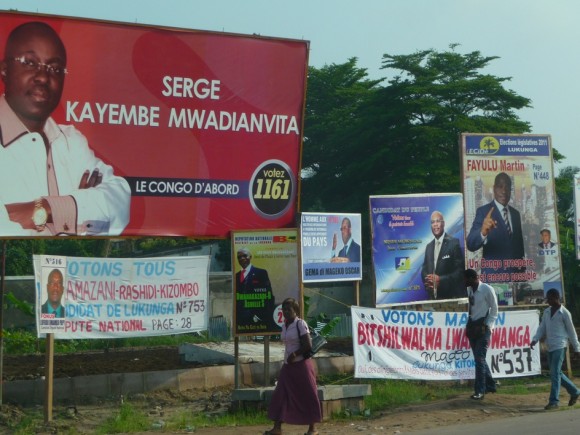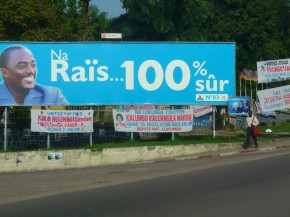
Every time I drive around Kinshasa at the moment I see a new fabric banner singing the praises of one of thousands of Congolese politicians. There's a palpable sense of excitement in the air as pick-up trucks pass me by with groups of young people on the back cheering and singing and waving flags as they campaign in their local area.
The Democratic Republic of Congo (DRC) goes to the polls on Monday.
This is only the second multi-party election in the country in 51 years. The nation was under Belgian colonial rule until 1960, when elections took place just prior to independence. Since then, dictatorship under Mobutu Sese Seko, followed by years of war, precluded elections until as recently as 2006.
This makes Monday a huge day for the people of Congo.
Elections are a massive logistical challenge in a country as vast as the DRC. Over 32 million voters have been registered. They will have to select from 11 presidential candidates. There are 63,865 polling stations, all of which require electoral kits – ballot boxes brought from China, and ballot papers from South Africa.

The ballot papers themselves are huge, with 18,386 Parliamentary candidates for 500 National Assembly seats. There are so many candidates, in fact, that the fabric banners I keep seeing on my journeys through Kinshasa carry not only the candidate's name, but his or her candidate number, to help people negotiate the thousands of names on the ballot paper.
The electoral commission has had support from the UN Mission to meet the logistical requirements, and the UN has brought in an extra 27 helicopters and three airplanes to meet the challenge.
With the huge importance and scale of these elections comes a number of risks.
Human rights observers agree that there is no evidence to date of systematic abuse – but several incidents of intimidation and violence have occurred. The security situation has been relatively calm, but there have been some violent incidents. There are fears that the situation could deteriorate if the losers contest the results of the election and succeed in mobilising enough people.
And there are the inevitable concerns about electoral fraud. While there has been no evidence of mass fraud, there has already been controversy over the number of double entries on the voter register. There were also rumours that ineligible groups – such as minors, foreigners and military – were sometimes registered.
The British Government has pushed the DRC's electoral commission to ensure that all parties have scrutiny of the electoral roll and to publish full voter lists on its website and in registration centres. And we have said that all double entries, whether added through human error or otherwise, must be scrutinised locally and amended.
So on Monday – subject to last minute changes – millions of Congolese voters will wade through the longest ballot papers the world has ever seen, making their choice from all the prospective candidates. This could be a decisive moment for the Congo, hopefully representing the consolidation of democracy and opening new opportunities for development.
The whole process will be closely watched – by at least 40,000 domestic election observers, and by the international community and the 500 observers they have sent.
I will be one of them – and I will be reporting on how it felt to be part of this historic process in my next blog.

Recent Comments